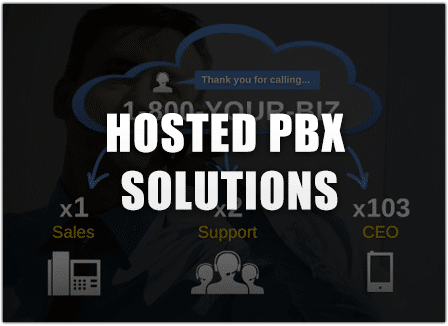A Quick Buyer’s Guide to Hosted PBX Solutions

What You Need to Know About Getting a Hosted PBX Service
What is a Hosted PBX Solution? A Hosted PBX (Private Branch Exchange) Solution refers to a business phone system hosted and managed by a service provider rather than being maintained onsite at your business location. This means that your phone system is delivered via your internet connection, and your provider performs all routing services on their servers rather than on a physical PBX box in your office.
Ready to try one now? See why Unitel is the simple & affordable hosted PBX solution you’ve been looking for!

What You Need to Know About Getting a Hosted PBX Service
A Hosted PBX (Private Branch Exchange) Solution refers to a business phone system hosted and managed by a service provider rather than being maintained onsite at your business location. This means that your phone system is delivered via your internet connection, and your provider performs all routing services on their servers rather than on a physical PBX box in your office.
Ready to try one now? See why Unitel is the simple & affordable hosted PBX solution you’ve been looking for!
A Quick Guide for Selecting a Hosted PBX Solution for Your Small Business
1. What are the features of hosted PBX solutions?
Features of hosted PBX solutions can vary depending on the provider, but most offer a range of functionalities such as:
- Multiple Extensions: This allows different departments or employees in your business to have their own extension numbers.
- Call Forwarding and Transfer: You can reroute calls to the appropriate department or individual.
- Automated Attendant (IVR): This feature greets callers and directs them to the correct extension based on their input.
- Voicemail & Voicemail to Email: Voicemails can be accessed not just through the phone but also sent to email inboxes for easier retrieval.
- Call recording: Calls can be recorded and archived for training or legal purposes.
- Conference Calling: Multiple people can join the same call, which is ideal for team meetings.
- Mobile apps: Many providers offer apps so employees can use their business phone system from their mobile devices.
2. What are the benefits of Hosted PBX Solutions?
- Lower Costs: Hosted PBX solutions typically require less upfront investment than traditional phone systems because there’s no need for onsite equipment and installation. The ongoing costs can also be lower due to reduced maintenance and upgrade costs.
- Scalability: Adding or removing lines as your business grows or changes is easy.
- Flexibility: Employees can use the system from anywhere with an internet connection, making it great for remote work.
- Simplified Management: The service provider handles all maintenance, upgrades, and troubleshooting.
- Advanced Features: As mentioned above, hosted PBX solutions often come with a variety of features that can improve communication and efficiency.
3. What’s the difference between a small business and enterprise hosted PBX solutions?
The primary difference between small business and enterprise hosted PBX solutions typically lies in the scale, complexity, and customization. Enterprise solutions might support a greater number of lines or extensions, offer more advanced features, such as CRM integrations, sophisticated analytics, and reporting, or allow for more customization to suit the specific needs of a larger organization. They also may offer enhanced support services.
4. How much do hosted PBX solutions cost?
The cost of hosted PBX solutions can vary greatly depending on the provider, the number of users or lines, the specific features you need, and the required support level. Prices typically ranged from $10 to $50 per user per month. Always contact providers directly for the most accurate and up-to-date pricing.
5. What’s the best way to evaluate a host PBX solution provider?
When evaluating a hosted PBX provider, consider the following:
- Features: Make sure the provider offers all the features your business needs.
- Pricing: Understand all costs involved, including setup, monthly fees, and any potential extra costs for add-ons or overages.
- Scalability: Check how easy it is to add or remove lines or features as your business needs change.
- Reliability: Look for a provider with a strong track record of uptime and good network infrastructure.
- Customer Support: Ensure they offer the level of support your business may require – is it 24/7, only during business hours, or on a ticket

